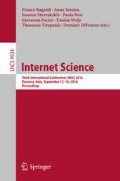Abstract
WikiRate is a Collective Awareness Platform for Sustainability and Social Innovation (CAPS) project with the aim of “crowdsourcing better companies” through analysis of their Environmental Social and Governance (ESG) performance. Research to inform the design of the platform involved surveying the current corporate ESG information landscape, and identifying ways in which an open approach and peer production ethos could be effectively mobilised to improve this landscape’s fertility. The key requirement identified is for an open public repository of data tracking companies’ ESG performance. Corporate Social Responsibility reporting is conducted in public, but there are barriers to accessing the information in a standardised analysable format. Analyses of and ratings built upon this data can exert power over companies’ behaviour in certain circumstances, but the public at large have no access to the data or the most influential ratings that utilise it. WikiRate aims to build an open repository for this data along with tools for analysis, to increase public demand for the data, allow a broader range of stakeholders to participate in its interpretation, and in turn drive companies to behave in a more ethical manner. This paper describes the quantitative Metrics system that has been designed to meet those objectives and some early examples of its use.
Access this chapter
Tax calculation will be finalised at checkout
Purchases are for personal use only
Notes
- 1.
e.g. Kinder, Lydenberg, Domini Research & Analytics (KLD) Social ratings, Dow Jones Sustainability indices.
- 2.
Corporate Knights Capital also produce Newsweek’s Green Rankings – http://www.newsweek.com/green/worlds-greenest-companies-2014.
- 3.
- 4.
- 5.
- 6.
Mandatory for companies that file with the United States Securities and Exchange Commission (SEC) under the 2010 Dodd Frank Act.
- 7.
- 8.
- 9.
A Metric’s full name is of the format Metric_Designer+Metric_Title, this allows metrics that share the same name to exist independantly in the system.
- 10.
Companies can answer questions about their own performance directly through the same mechanism, but must declare that the account used to add this data is operated by an official company representative.
- 11.
Metric names are of the format Designer+Title, the URL for this metric is http://www.wikirate.org/Ranking_Digital_Rights+RDR_Total_Score.
- 12.
- 13.
- 14.
There are 290 metrics already available on the platform.
- 15.
It is up to users whether they identify themselves or how they describe themselves, with the exception of users who have the authority to speak on behalf of companies or other registered organisations.
References
Aguinis, H., Glavas, A.: What we know and dont know about corporate social responsibility a review and research agenda. J. Manag. 38(4), 932–968 (2012)
Benkler, Y.: The Wealth of Networks: How Social Production Transforms Markets and Freedom. Yale University Press, New Haven (2006)
Bloomberg: Customers using esg data increased 76% in 2014. http://www.bloomberg.com/bcause/customers-using-esg-data-increased-76-in-2014. Accessed 11 Mar 2015
Brammer, S.J., Pavelin, S.: Corporate reputation and social performance: the importance of fit. J. Manage. Stud. 43(3), 435–455 (2006)
Chatterji, A.K., Levine, D.I., Toffel, M.W.: How well do social ratings actually measure corporate social responsibility? J. Econ. Manag. Strategy 18(1), 125–169 (2009)
Chatterji, A.K., Toffel, M.W.: How firms respond to being rated. Strateg. Manag. J. 31(9), 917–945 (2010)
Christmann, P., Taylor, G.: Firm self-regulation through international certifiable standards: determinants of symbolic versus substantive implementation. J. Int. Bus. Stud. 37(6), 863–878 (2006)
Corporate Knights Capital: Measuring sustainability disclosure: ranking the world’s stock exchanges. http://www.corporateknights.com/wp-content/reports/2014_World_Stock_Exchange.pdf. Accessed 11 Mar 2015
Doolin, B., Troshani, I.: Organizational adoption of xbrl. Electron. Markets 17(3), 199–209 (2007)
European Commission: non-financial reporting. http://ec.europa.eu/finance/company-reporting/non-financial_reporting/index_en.htm. Accessed 11 Mar 2015
Fonseca, A.: How credible are mining corporations’ sustainability reports? A critical analysis of external assurance under the requirements of the international council on mining and metals. Corp. Soc. Responsib. Environ. Manag. 17(6), 355–370 (2010)
Gatziaki, V., Papadopoulos, S., Tsampoulatidis, Y., Diplaris, S., Mills, R., Kompatsiaris, Y.: Scalable analytics techniques for user contributions v2. Technical report D5.5.2, WikiRate Project, September 2015
Global Witness and Amnesty International: Digging for transparency. https://www.globalwitness.org/en/campaigns/conflict-minerals/digging-transparency/. Accessed 11 Mar 2015
Laufer, W.S.: Social accountability and corporate greenwashing. J. Bus. Ethics 43(3), 253–261 (2003)
legislation.gov.uk. Modern slavery act 2015t (2015). http://www.legislation.gov.uk/ukpga/2015/30/section/54/enacted
Marin, M.: How the wisdom of crowds can help defend human rights. https://www.amnesty.org/en/latest/campaigns/2015/10/wisdom-of-crowds-defend-human-rights/. Accessed 11 Mar 2015
Mills, R., Paoli, S.D.: Interim report on user and community dynamics. Technical report D3.3.3, WikiRate Project, September 2015
Mills, R., Fish, A.: A computational study of how and why reddit.com was an effective platform in the campaign against SOPA. In: Meiselwitz, G. (ed.) SCSM 2015. LNCS, vol. 9182, pp. 229–241. Springer, Heidelberg (2015)
Prasad, A.: India’s new csr law sparks debate among ngos and businesses 2014. http://www.theguardian.com/sustainable-business/india-csr-law-debate-business-ngo. Accessed 11 Mar 2015
ProPublica: Free the files. https://projects.propublica.org/free-the-files/sessions/new. Accessed 11 Mar 2015
Quartz: This is how much a bloomberg terminal costs. http://qz.com/84961/this-is-how-much-a-bloomberg-terminal-costs/. Accessed 11 Mar 2015
SEC: Dodd-frank conflict minerals disclosure fact sheet. https://www.sec.gov/News/Article/Detail/Article/1365171562058. Accessed 11 Mar 2015
Sestini, F.: Collective awareness platforms: engines for sustainability and ethics. IEEE Technol. Soc. Mag. 31(4), 54–62 (2012)
Sharkey, A.J., Bromley, P.: Can ratings have indirect effects? Evidence from the organizational response to peers environmental ratings. Am. Sociol. Rev. (2014)
Stockholm Environment Institute: A guide to representation concentration pathways. https://www.sei-international.org/mediamanager/documents/A-guide-to-RCPs.pdf. Accessed 11 Mar 2015
United Nations Environment Programme. Raising the bar
Verrecchia, R.E.: Discretionary disclosure. J. Account. Econ. 5, 179–194 (1983)
Sutantoputra, A.W.: Social disclosure rating system for assessing firms’ csr reports. Corp. Commun. Int. J. 14(1), 34–48 (2009)
Acknowledgement
This work is supported by the WikiRate FP7 project, partially funded by the EC under contract number 609897.
Author information
Authors and Affiliations
Corresponding author
Editor information
Editors and Affiliations
Rights and permissions
Copyright information
© 2016 Springer International Publishing AG
About this paper
Cite this paper
Mills, R. et al. (2016). WikiRate.org – Leveraging Collective Awareness to Understand Companies’ Environmental, Social and Governance Performance. In: Bagnoli, F., et al. Internet Science. INSCI 2016. Lecture Notes in Computer Science(), vol 9934. Springer, Cham. https://doi.org/10.1007/978-3-319-45982-0_7
Download citation
DOI: https://doi.org/10.1007/978-3-319-45982-0_7
Published:
Publisher Name: Springer, Cham
Print ISBN: 978-3-319-45981-3
Online ISBN: 978-3-319-45982-0
eBook Packages: Computer ScienceComputer Science (R0)

